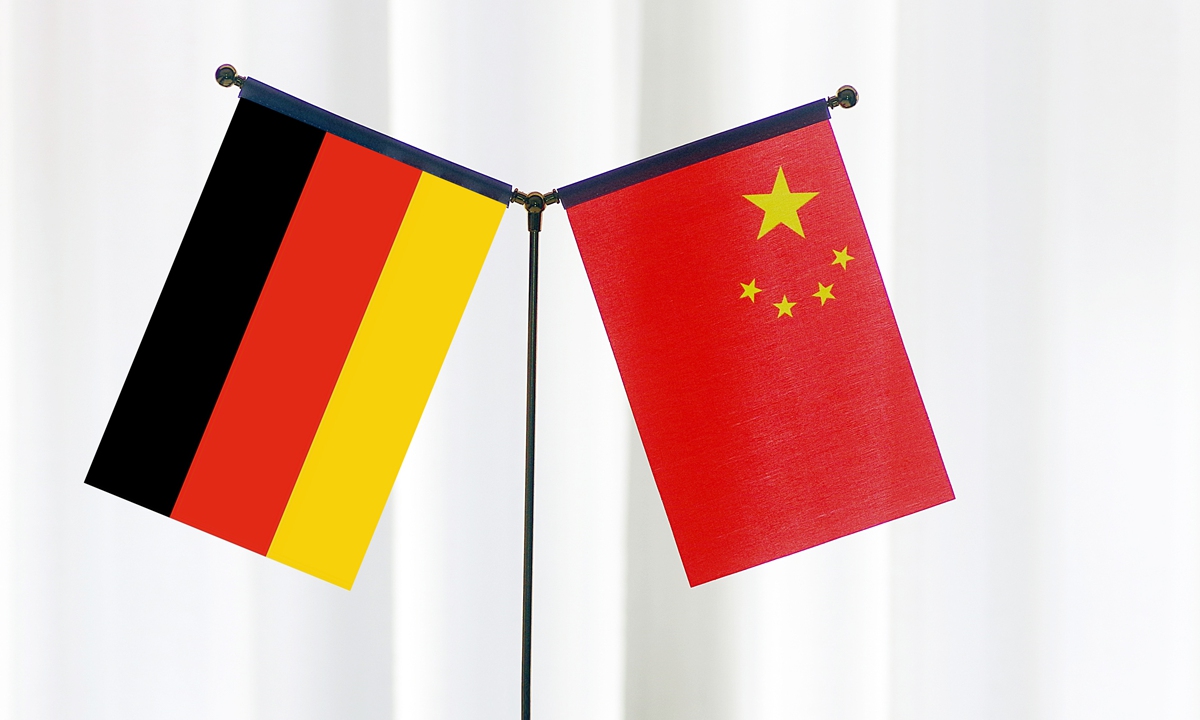
China Germany Photo:VCG
Chinese President Xi Jinping met with German Chancellor Olaf Scholz, who was visiting China for the second time since taking office, on Tuesday morning. Scholz's visit to China has attracted much attention, as the chancellor has been accompanied by a "grand" visiting delegation including several German business executives of manufacturing giants and he visited the cities of Chongqing, Shanghai, and Beijing in just three days.
In fact, Scholz's visit to China comes at a complex and difficult time for China-Germany and even China-Europe relations. The US is pushing Europe to view China as a systemic rival and strategic competitor, placing undue pressure on China. From decoupling with China to "de-risking" from China, the US cannot do it itself, but demands that Europe follow suit to be strict with China, exacerbating Europe's crisis.
However, Scholz's visit to China shows that he and the government he represents have recognized the importance of China and that it is time to take more action. As a major European country, how Germany can constructively steer China-German relations is of great significance.
Scholz's first stop in China was Chongqing. While visiting Bosch Hydrogen Powertrain Systems (Chongqing) Co, Ltd, a company jointly operated by Germany and China, Scholz praised the operation. A video of him giving a thumbs-up at the site was also uploaded to his newly opened TikTok account. During a dialogue with students at Tongji University's Jiading Campus in East China's Shanghai, he humorously referred to himself as an old friend of Shanghai. He said that he saw China's recent development changes and Germany-China cooperation are of vital importance to the world's future on Monday during his third visit to Shanghai Municipality.
Chinese experts believe that Scholz's current visit is more like an exploration of the "real China."
In his meeting with President Xi, Scholz said during his trip to Chongqing and Shanghai together with representatives of the German business community, he witnessed the great economic progress China made over recent years. He added he was particularly impressed by the close and sound cooperation between German and Chinese businesses. The German side stands ready to enhance communication and coordination with the Chinese side to jointly tackle climate change and other global challenges, commits to upholding the multilateral international order and promoting world peace and development, and disapproves of conflict and confrontation, Scholz said.
Scholz's words and actions during his visit to China reflect his confidence in developing China-Germany relations and his understanding of the mutually beneficial nature of these relations.
The Western understanding of the Chinese economy is now being led by some misconceptions. On the one hand, there is talk of the "collapse of the Chinese economy," and on the other hand, there are false accusations of Chinese "overcapacity" threatening the European economy. These two viewpoints are contradictory in themselves. "Scholz's visit will help correct these misrepresentations," Sun Keqin, a research fellow at the China Institutes of Contemporary International Relations, told the Global Times. Therefore, Scholz's firsthand experience and observation of the current situation in China, as well as discussions with joint ventures between China and Germany, German companies in China, and representatives, will allow him to understand the real situation, Sun added.
Scholz's visit indicates he hopes not to be misled by the US. He wants to go and observe by himself and seize new opportunities for connection with China, said Wang Yiwei, a professor at the School of International Relations at Renmin University of China.
This year marks the 10th anniversary of the establishment of the China-Germany all-round strategic partnership. As the world's second- and third-largest economies, and Germany being one of the strongest economies in Europe, Scholz's visits to China since taking office can play a significant role in stabilizing bilateral relations between China and Germany and even in guiding relations between China and Europe, Sun said. The friendly connection between China and Germany can also clearly show what the nature of mutually beneficial cooperation between China and other countries is, what China means by win-win, and what prospects it brings for peace and development to the world.
There are many uncertainties in the world, but it is certain that China has always regarded Europe as a partner rather than a competitor. China has consistently valued Europe, and hopes to cooperate with Europe for mutual benefit. As President Xi said, "the mutually beneficial cooperation between China and Germany is not a 'risk,' but a guarantee for the stability of bilateral relations and an opportunity for the future."
The author is a reporter with the Global Times. suyaxuan@globaltimes.com.cn




